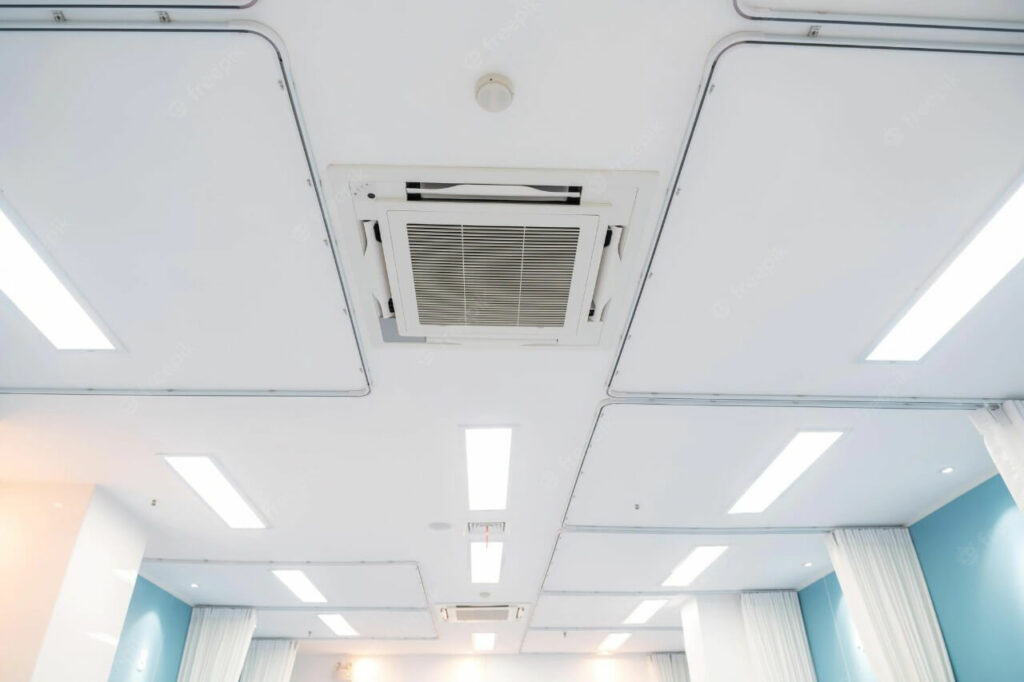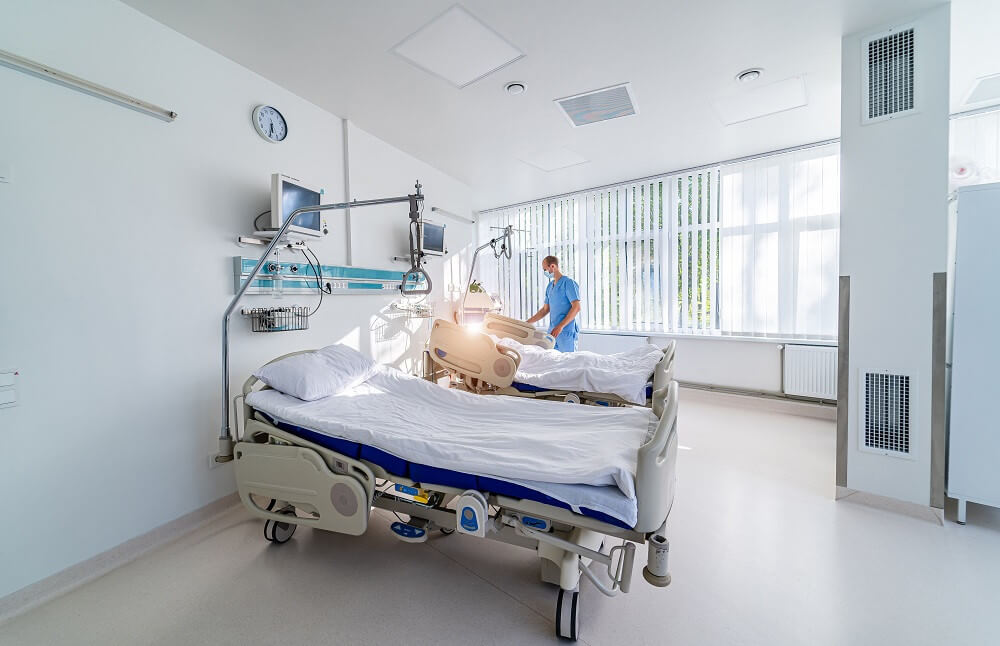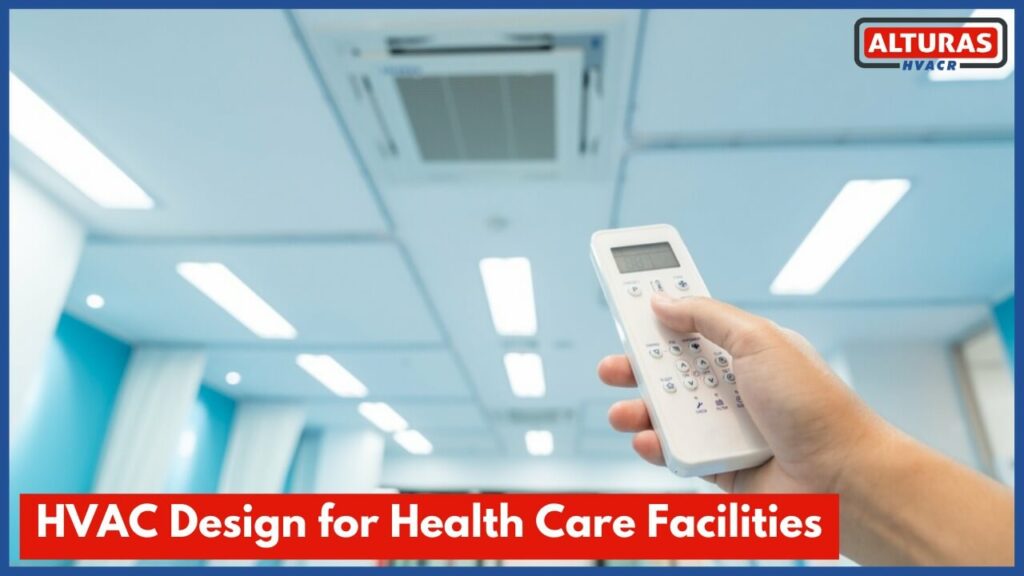In a commercial or residential area, the HVAC system provides occupants with fresh air, reduces carbon dioxide levels, and sets the temperature and humidity at comfortable levels. Whereas, if we talk about healthcare facilities, the HVAC design for healthcare facilities is more important and complex.
In hospitals, indoor air quality, air conditioning, heating, ventilating systems, and other aspects of HVAC systems and control matter greatly. Since a healthcare facility houses numerous types of patients with various illnesses, HVAC systems in hospitals must maintain comfortable environmental conditions and humidity levels.
They must help maintain clean environments so that patients aren’t at risk and medical equipment can properly function.
HVAC Standards for Hospitals
Hospitals can have a huge number of rooms of various types ranging from isolation and treatment rooms to meditation and laboratory rooms. The ASHRAE Standard 170 sets requirements for different rooms and areas in a hospital to function correctly.
The ASHRAE standard considers nine total variables:
- Air pressure relationship to adjacent areas
- Minimum outdoor air changes per hour (ACH)
- Minimum total ACH
- Unoccupied turndown
- Direct exhaust outside
- Room unit recirculation
- Minimum filter efficiency
- Relative humidity
- Temperature
Hospital HVAC System Design Features

Indoor Air Quality and filtration
Filtration is critical to indoor air quality and infection control. There are two types of filters used in hospitals
HEPA filters
HEPA is an acronym for “high-efficiency particulate air ” filter. This type of air filter is used in hospitals and can remove at least 99.97% of dust, pollen, mold, bacteria, and any airborne particles with a size of 0.3 microns (µm). Patients who are on airborne precautions for possible aerosolizing infections are usually placed in hospital rooms with HEPA filters. This reduces their risk of cross-contamination and infections.
High-grade filters
A medical-grade HEPA filter system is used in hospitals to keep the highest amount of harmful contaminants, such as construction debris and infectious diseases, from spreading. High-grade filters may also be able to remove harmful viral particles attached to other contaminants in the air. Moreover Advanced filtration also
- Restrict cross-contamination within and between operating rooms, isolation rooms, and other hospital rooms requiring exacting cleanliness
- provides effective ventilation which is crucial to maintain appropriate indoor air quality.
- Filter outflow air to prevent airborne transmission to sick rooms.
- Provide consistent top-quality air through regular maintenance and filter replacement
Temperature and Humidity Controls
HVAC systems that control both the temperature and humidity of the air are used in hospital wards. Humidity levels should not be too low but also not too high. To prevent the propagation and proliferation of biological contaminants, the humidity should ideally be kept between 40% to 60%
Adequate temperature and humidity in hospitals matter a lot as they provide a comfortable environment in any given facility. It controls the infection and may affect the rate at which burns heal. Inadequate temperature and humidity can affect the healing process of wounded patients badly.
Hospital HVAC systems must provide different temperatures for different parts of the facility. Sensitive testing and research equipment must be operated at certain temperatures for proper functioning
Infection control
One of the primary objectives of the hospital HVAC system is to prevent a patient from catching an infection while hospitalized.
In a hospital environment, there tend to be high concentrations of harmful microorganisms. Infections are likely to transfer as a result of activities and procedures taking place within the facility. The three main routes responsible for infections are contact, droplet, and airborne transmission.
Moreover, dust contaminated by infectious agents is also highly capable of causing an outbreak of infection. Even after the departure of the infectious patient from whom the pathogens originated these dust particles may become contaminated when dried sputum and other infectious secretions that are suspended in the air. These dust particles mix with environmental dust.
Energy efficiency in Hospitals
HVAC systems contribute to a big part of hospitals’ energy consumption for several reasons:
- Ventilating systems, temperature, and humidity control run constantly. They must be kept to precise levels
- Systems that are due for a retrofit or upgrade.
- Certain rooms must be kept at exact temperatures and humidity levels regardless of extreme heat or cold conditions outside.
Regular maintenance can reduce energy consumption and costs by improving overall system efficiency like any commercial HVAC system. Upgrades and replacement of the components that maximize energy efficiency can also cut energy costs and use. Therefore, saving money for hospitals in the end.
Hospital Ventilating Systems

Hospital ventilation systems are part of the HVAC filtration system that helps to control the concentration of contaminants and diseases to keep them at safe levels. Medical facilities routinely produce fumes, chemicals, and airborne diseases that pose great health and safety risks to patients and staff. Moreover, well-functioning ventilation systems prevent airborne and droplet transmission.
Airborne Transmission controls
Airborne transmission occurs when either airborne droplet nuclei or dust particles spread infectious agents.
Droplet nuclei transmission control
The velocity with which coughing and sneezing expel droplets from the respiratory tract results in large numbers of bacteria or viruses entering the environment in smaller droplets. These droplets rapidly evaporate in the air leaving a residue. These droplets remain airborne in the surrounding spaces and circulate until they are mechanically removed by the ventilation system.
Control of environmental factors such as special air handling and ventilation is necessary to prevent airborne transmission of microorganisms.
Benefits of HVAC design for healthcare facilities
Since HVAC design for healthcare facilities is all about providing a safer environment for the patients and staff. Therefore, hospitals should consider investing in HVAC systems with the appropriate components and infrastructure to provide a suitable and sustainable environment. It should support segregated and isolated spaces for airborne pathogens like COVID-19 or other viruses. An effective HVAC healthcare system should
- Restrict the cross movement of air in and between the various healthcare departments.
- Provide effective ventilation which is crucial to maintain appropriate indoor air quality.
- Should provide an effective ventilation and filtration system to dilute and reduce contaminants such as airborne microorganisms, odor, irritants, viruses, hazardous chemicals, and radioactive substances.
- Should be able to achieve different temperature and humidity requirements for various areas and control environmental conditions.
- Design HVAC in such a way as to minimize the risk of transmission of airborne pathogens and develop a sterile and healing environment for patients and staff.
These requirements demand very high quantities of outside air with the significant treatment of this ventilation air, including cooling, dehumidifying, reheating, humidifying, and filtration.
Alturas HVAC Contractors: Experts in Hospital HVAC
Alturas HVAC contractors in Los Angeles have excellence and expertise in designing HVAC systems for various hospitals and industrial and commercial areas. Our team of experts in Los Angeles is well aware of all types of complex HVAC system requirements in hospitals. Our team is skilled and equipped with the latest HVAC technologies and provides installation, repair, and even consultation services. We are capable of fulfilling all types of HVAC design requirements
Our team not only ensures smooth operation and long-lasting functioning of healthcare HVAC systems but can assist with installation, retrofits, and other service needs for hospital systems.
Contact Alturas Contractors team for more information or consultation.

